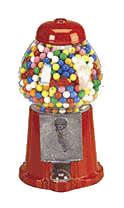593What Really Happens If You Swallow Your Gum?
Your mom told you a million times not to do it. You did it
anyway. Did it really sit in your stomach for seven years?
Could it possibly have wrapped around your intestines and
strangled them? Is a gum tree still growing inside you? What
really happens if you swallow your gum?
We've all heard the old wives tale warning of such disaster,
but to our knowledge there's been no serious health issues
related to swallowing it (choking on gum is another matter,
though.)
Though your stomach can't break down a piece of gum the same
way it breaks down other food, your digestive system can move
it along through normal intestinal activity (in other words,
it comes out the other end.)
|

When swallowed, gum is eliminated as human waste in
the same way - and at the same rate - as any other swallowed
matter.
|
Wrigley, one of today's top leading gum manufacturer's, explains,
"Chewing gum has five basic ingredients - sweeteners,
corn syrup, softeners, flavors and gum base (the part that
puts the "chew" in chewing gum). The first four
ingredients are soluble, meaning they dissolve in your mouth
as you chew. Gum base doesn't. And although it isn't meant
to be swallowed, if it is, it simply passes through your system,
just like popcorn or any other form of roughage." It
starts traveling down your esophagus, into your stomach, enters
the small intestine, and makes its way to the large intestine.
This normally takes only a few days.
Gum Can Potentially Be Hazardous, However
According to Alisa Raines Lefevre, R.N, C.R.R.N, "the
greatest harm of swallowing bubble gum is not even digestive
in nature. For a 2-year old, chewing bubble gum poses a significant
risk of choking." Most toddlers have a full set of teeth,
but may lack maturity in their chewing and swallowing skills.
|

About 15% to 30% of chewing gum is gum base, a natural
or synthetic indigestible rubbery substance that makes
the treat resilient to hours of jawing.
|
Dr Karl S. Kruszelnicki, a physician, author, and science
commentator on radio and television says "the bad (and
relatively uncommon) side effects of chewing gum include diarrhea,
tummy pain and flatulence
mouth ulcers (from cinnamon flavouring), high blood pressure
and low blood potassium (from liquorice flavouring) and higher
blood mercury levels (from dental amalgam already in your
mouth, but only in cases of excessive chewing)." Other
unpleasant side effects can include mechanical injury to the
teeth, overuse injury (temporomandibular joint syndrome) and
even extrusion of dental repairs.
Is Sugar-Free Gum Better?
While there are no recorded events that prove the old wives
tale right, Dr. Weil, a popular health and alternative medicine
doctor, says that "sugar-free gum, whether swallowed
or chewed in large amounts, can cause digestive problems.
The sugar substitutes (hexitol, sorbitol, and mannitol, to
name a few) found in sugar-free gum are not absorbed, but
pass into the small intestine and colon, where they can cause
diarrhea."
In addition, aspartame - a popular sugar substitute in gum
- has been linked to decreased vision, headaches, dizziness,
nausea, shortness of breath, and many other ear and skin side
effects. Some experts have also questioned another popular
sugar substitute, Splenda, also known as sucralose, claiming
that too little is known about its safety due to a lack of
human studies.
Back in the Beginning
|

Kids in North America spend ½ a billion dollars
on bubble gum every year.
|
It wasn't until 1869 that modern chewing gum products appeared.
Mexican General Antonio Lopez de Santa Anna, conqueror of
the Alamo, hired New York inventor Thomas Adams to develop
a new form of a rubber substitute using chicle, the dried
milky sap of the Mexican Sapodilla tree. Chicle didn't quite
work as a replacement for rubber, but as a gum it soon dominated
the market.
Sticky Side Note
When spat on the ground, chewing gum will stick firmly and
is very difficult to remove. For this reason, chewing gum
has been banned in Singapore since 1992 as a result of a "gum
infested" city. Instead of throwing away their gum, or
swallowing it, seems like the city folk in Singapore decided
to spit it out on the streets or tack it to the walls for
disposal.
It was only a year ago that the Free Trade Agreement went
into affect in Singapore, and therapeutic gum can be purchased
with a physician's prescription. Try to smuggle it into Singapore
next time you are visiting, you'll get a "Go Directly
To Jail" card for one year, and a hefty fine of $5500
(US).
Final note
Since chewing gum has been chewed, parents have been trying
to prevent their children from swallowing it by warning them
of "gum trees," strangled intestines and more. Truth
is, if you decide to chew a piece and you happen to swallow
it, don't worry - it will pass right through in a few days.
The Old Wives' Tale Club Answers ... ©
is a regular SixWise.com column that explores and exposes
the truth behind popular myths toward maintaining or improving
your safety, health, wealth, relationships, career, or home
... or simply making you say, "Oh!" or maybe
"Ah ha!" If you have a myth, fable, legend or any
of their kin that you'd like The Old Wives' Tale Club to consider
for exploration, email it to editor@sixwise.com